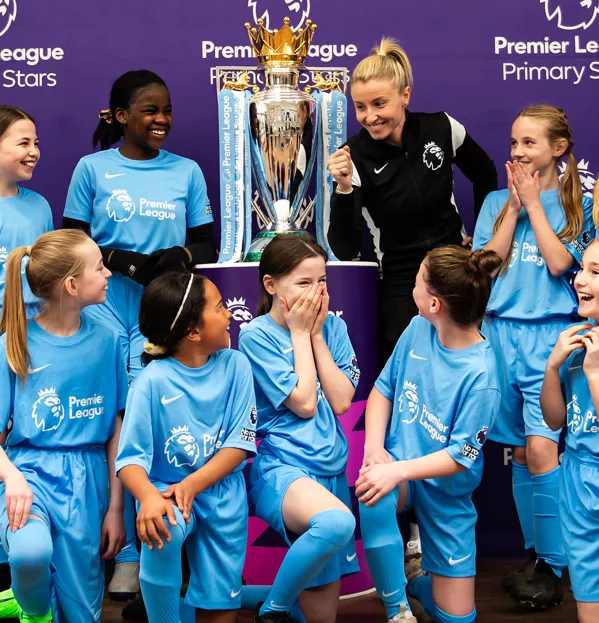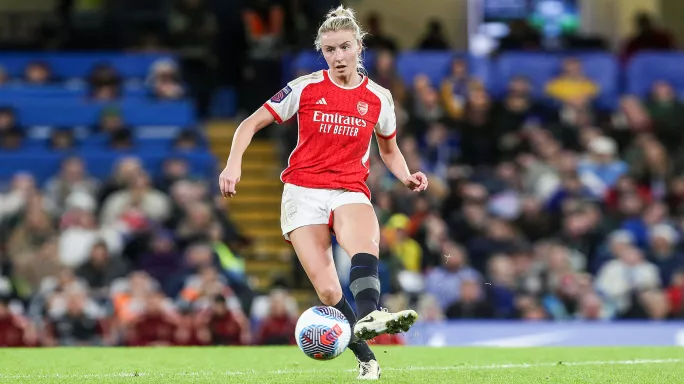“You can have everything inside you, but if somebody else is restricting you, that’s the problem,” says Leah Williamson, captain of the England Women’s football team. “And that’s an issue that women have faced in football for a long time now.”
Williamson has a glowing track record - including an Arsenal league win last season and leading the Lionesses to a monumental victory in the UEFA European Championship in 2022 - but she says there is much more work to be done, especially in relation to changing views on girls’ participation in the sport.
And it is on this mission that she has returned to the assembly hall of her former school, Portfields Primary in Milton Keynes, to present their girls’ football team with a kit as part of the Premier League Kit Scheme.
Remove bias of girls playing football
Williamson is here with the Premier League and their new Active Allies resource, which aims to remove the bias around girls playing football.
The aim isn’t necessarily to get the next generation to follow her path to professional glory, but to partake in one of Britain’s most beloved pastimes.
Girls can benefit from football in particular, she says, because it “changes the stereotype of what they do and what we believe a girl should be”.
Although Williamson’s love for football developed outside of school (she joined Arsenal’s youth programme aged 9), she says her passion was fostered by teachers and her time on the girl’s football team at Portfields.
“I was so lucky, I had great teachers and this is why I’m emotional about coming back,” she tells Tes as she hands out new kits to the pupils.
She said: “They celebrated my success as if there was nothing weird about a girl playing football, but we know that there was.
“We took sport really seriously at this school, which is probably where I got my competitive edge from,” she laughs, posing with the current girls’ football team, which is still running more than a decade after she left.
While Williamson is delivering her assembly to the pupils in a climate shaped by the Lionesses’ historic Euros win last year, female pupils still face many barriers when it comes to taking part in the game.
According to the latest figures from the Football Association, just 63 per cent of primary schools in England offer girls equal access to football in PE lessons.
“I think the main thing is that they have a choice,” Williamson says. “Not all girls will be interested in it, and that’s totally fine. I just don’t think that we should be deciding for them what they do and what they don’t.”
Williamson says a change is needed in the messaging around PE in general, to highlight that sports can be as much about enjoyment as physical health.
And it’s a pressing issue for young women right now: a 2023 survey from the Youth Sport Trust found that only 64 per cent of girls enjoy taking part in PE, compared with 86 per cent of boys.
The problem with PE
“The focus is on grades, but what’s the point of having a clever but unhealthy child,” Williamson asks.
The Youth Sport Trust’s survey also found particular barriers for girls taking part in PE, such as worrying about how they look or lacking confidence.
“Girls have to feel confident when they go on to the pitch or the playground,” Williamson continues. “Should we be waiting for boys to allow us to play, or should it be a given?”
Concerns over PE have been raised at governmental level, too. Ofsted warned last year that many schools are failing to meet the ambition of the national curriculum in relation to the breadth and depth of PE offered.
Williamson proposes that the best thing schools can do is leave the option of participation to the girls themselves.
“Don’t take away their choice, offer it as much as you can,” she says. “I just think it’s worth the gamble. We should be bringing out the best in kids.”
To download the free Active Allies resource, please visit Premier League Primary Stars.
For the latest research, pedagogy and practical classroom advice delivered directly to your inbox every week, sign up to our Teaching Essentials newsletter





